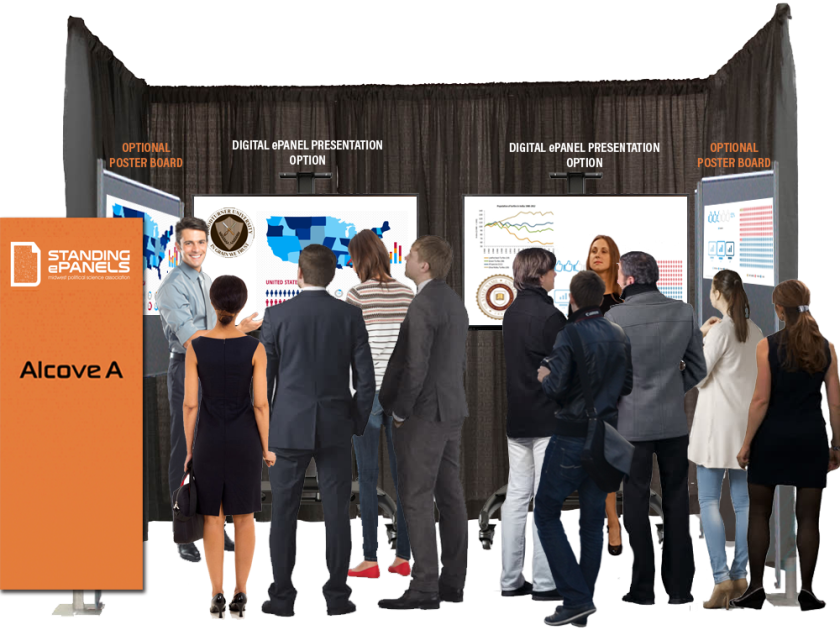By Colleen Wood of Columbia University

In the exhibition hall at MPSA, it is easy enough to get stuck in the book displays or free coffee stands. But for those who push past the publishing stands, an ecosystem of poster presentations awaits.
This year, MPSA experimented with a new presentation format, Standing ePanels, which include up to eight papers and offer students a chance to share a digital poster or brief PowerPoint showcasing their research. The Standing ePanels covered a range of topics from public policy to international institutions to political rhetoric; I watched several presentations across panels and was overwhelmingly impressed by the sophisticated data analysis and sharp presentation skills.
I also enjoyed the chance to take a more active role in a Standing ePanel. I was assigned as a discussant and chair of a session on social issues, which featured papers on a diverse range of topics including international adoption law, gender representation in textbooks, and the relationship between trade and natural disaster recovery. In the chaos of the Palmer House and the bustle of the exhibition hall, this small group of young scholars engaged in a supportive space for feedback and skill-building. Jennifer Wu of Dartmouth College conducted a survey experiment on Qualtrics to understand how gender affects perceptions of politicians’ uncivil behavior. Talahiva Salakielu of Brigham Young University Hawaii used multivariate regressions to analyze novel survey data on the dropout rates of female and international students at her university. Tatiana Hulan from Lake Superior State University conducted interviews with a Russian adoption agency to understand how the country’s ban on international adoption has affected children.
Similar to a traditional panel, there was a mix in the presented works’ progress. While some of the research was conducted as part of an undergraduate thesis or capstone project and written up in a very polished manner, several of the papers were assignments for seminars that professors saw promise in. Everyone was eager for feedback, and the discussant comments balanced clarifying questions and suggestions for future extensions.
While an undergrad, I participated in several research workshops at my own university, but never would have dreamed of presenting such sophisticated data analysis at one of the discipline’s largest conferences. Before the panel, I asked the presenters how they came to know about MPSA. Most mentioned hearing about the opportunity through their department, and two said their advisors encouraged them to apply.
Undergraduate students obviously stand to benefit from participating in a Standing ePanel. They offer an opportunity to practice building a slide deck, develop presentation skills, and experience the interactive engagement of a traditional panel. Graduate students can also build important skills through the ePanels. Serving as a discussant and moderating a panel as chair are foundational to the discipline, but rarely explicitly taught in PhD programs. This was the first time I have chaired an academic panel and given formal discussant comments; the chance to build these skills was an unexpected bonus of coming to MPSA for me.
I was especially touched by the earnest compliments and congratulations after the Standing ePanel finished and hope to see these young scholars at future MPSA meetings.
About the Author: Colleen Wood is a PhD student at Columbia University. Her research focuses on identity, migration, and the state in Central Asia. She writes about Central Asian society and politics for The Diplomat and is also a blogger for the 2019 MPSA conference in Chicago. Get in touch with Colleen on Twitter at @colleenewood or email at c.wood@columbia.edu.
